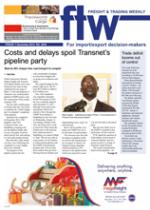Domestic instability does not
bode well for South Africa’s
trade environment, especially
in light of the country having
reached a cumulative trade
deficit of R86.1 billion for
2012.
Economists have warned
that the continued instability
in the mining sector, talks
of nationalisation, ongoing
labour strikes and increased
electricity prices are
impacting negatively on the
economy, creating a business
environment best described as
unstable.
“Business does not handle
instability well,” said Busisiwe
Radebe, an economist with
Nedbank. “In light of the
ongoing global economic
turmoil we have to be very
watchful of what happens
domestically. It is impacting
the country negatively.”
She said while South
Africa’s imports, despite a
slight decrease in the figures,
remained relatively stable, the
country’s growing cumulative
account deficit was a major
concern. This was due to the
massive decline in exports.
“A year ago the cumulative
deficit was only around
R5 billion. In September it
had already reached R86.1
billion. At Nedbank we are
forecasting that the current
account deficit as a percentage
of gross domestic product will
be more than 5% compared to
the 3.3% it was last year.”
All of this continues to turn
sentiment against the local
currency – and while exports
in theory should be supported
by a weaker rand this is not
happening.
“South Africa does not
operate in a vacuum and we
need to be cognisant of what
is happening internationally,”
said Radebe. “At the same
time we need to address
issues domestically that
are increasing instability
and affecting our economic
growth.”
With the global economy
expected to remain weak for
at least several more years
– the IMF expects global
growth to be around 3.3%
in 2012 – South Africa can
ill afford the wild cat strikes
that have plagued its mining
industry or the prolonged
violent strikes of the road
freight sector, while electricity
increases continue to impact
on cost as well.
According to FNB chief
economist Cees Bruggeman,
the labour unrest and strike
action especially has had
an intimidating impact on
private business expectations,
with business confidence
remaining disappointingly
low.
Added to National
Treasury forecasts of growth
in developed countries
remaining below 1.5%
this year and next, while
developing countries will
grow between 5 and 5.5% per
annum, the country needs to
pull out all the stops to remain
competitive.
“In the euro area, which
remains South Africa’s most
important export destination,
it is expected to contract by
0.4% this year and only grow
by 0.2% in 2013,” said a
spokesman for the Treasury.
“At the same time growth
has slowed in China and
India. This has also affected
the South African economy
through lower commodity
prices and slower growth in
trade.”
Domestic instability worsens less-than-rosy outlook
07 Dec 2012 - by Liesl Venter
0 Comments
FTW - 7 Dec 12

07 Dec 2012
07 Dec 2012
07 Dec 2012
07 Dec 2012
07 Dec 2012
07 Dec 2012
07 Dec 2012
07 Dec 2012
Border Beat
Featured Jobs
New
New
